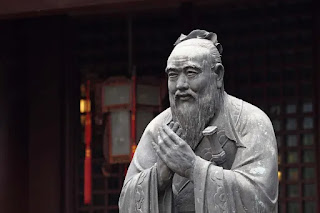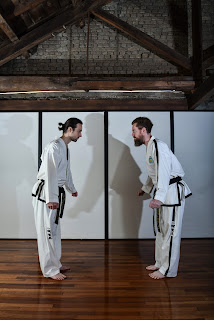 |
| Calligraphy by Choi Hong-Hi of the Tenets of Taekwon-Do |
General Choi Hong-hi, the founder of ITF Taekwon-Do, composed a list of five tenets that he required practitioners to recite and embody. The tenets, as they are translated into English, are courtesy [예의], integrity [염치], perseverance [인내], self-control [극기], and an indomitable spirit [백절 불굴]. As I pointed out in a previous essay, with some of these terms, there is something lost in translation. This is also the case for the first tenet, “courtesy”.
In English, the word “courtesy” suggests polite and respectful behaviour with proper etiquette, which is close to the translations one would get if you search the equivalent Korean word [예의] in a Korean-English dictionary: manners, etiquette, courtesy, politeness, proprieties, decorum, and civility.
While this may be a general understanding of the term, the Korean word “ye-eui” has a deeper connotation which one may glimpse when you look at the hanja (Chinese characters) on which the word is based. The hanja for “ye-eui” [예의] is 禮儀. The first character [禮] can translate to manners (decent and respectable behaviour) or ritual propriety (proper actions during rites and ritual ceremonies), while the second character roughly translates to proper etiquette, but can also translate as righteous or lawful behaviour. What I want to point out here is that the Korean term “ye-eui” [예의] has a much more demanding implication than the English word “courtesy”. Courteous behaviour may simply be good manners and one’s adherence or disregard of them does not really have any serious consequences. Whereas the Korean term implies the righteousness or lawfulness of one’s conduct.
 |
| Confucius was a Chinese sage-philosopher whose teachings greatly affected East Asia. There are still many aspects of Confucianism that are part of modern Korean culture. |
Confucianism is fundamental to Korean culture and central to Confucianism is the concept of li (‘ritual propriety’ or ‘sense-of-ritual’). Li covers a wide range of conduct and behaviour from religious rites to state and governmental rituals, to social ceremonies such as at weddings and funerals, to appropriate etiquette for social relations. In other words, it covers every aspect of one’s life: in religious matters, with regards to the State, in society at large, within families, and among all relationships. It is both the adherence to state laws and the respect one shows to one’s parents and elders, including the good manners when interacting with people in daily life, even such seeming trivialities as drinking etiquette and table manners.
Confucianism (cf. Mencius) believes that we have the seeds of li innately inside us, but that a ‘sense-of-ritual’ should be learned and developed. The idea of “ritual” here should be understood more broadly to include all appropriate behaviours: manners, etiquette, lawful deeds and righteous conduct. Furthermore, notice the concept “sense-of-ritual”: it is not merely about adhering to codes and rules of conduct; rather, there should be an internal sense of appropriate behaviour. Thus, “sense-of-ritual” refers to a developed moral sensibility.
The Confucian ideal is to be a junzi [君子], often translated as “a gentleman” or “superior person.” (The Korean equivalent is a gunja [군자], a person of virtue and culture.) When Confucius’ greatest disciple Yan Hui asked his Master about perfect virtue (ren 仁), Confucius answered: “Don’t look in a way that is not li, don’t listen in a way that is not li, don’t speak in a way that is not li, and don’t move in a way that is not li.” It would be incorrect to conclude that it is all about outward behaviours—how one ought to or ought not to behave. Confucius’ answer was in regard to his student’s question about virtue. Virtue is more than just an outward display; in a righteous person, virtues have become internalized. Confucian scholars like Mencius considered li a virtue alongside other virtues such as benevolence, filial piety, and sincerity. To another student Confucius answered: “Let your words be sincere and truthful and your actions honorable and careful.”
 |
| Bowing before training is one part of showing courtesy. |
To bring it back to our original discussion of Taekwon-Do’s tenet of courtesy, the Chinese term li is in fact the same first character in the word “ye-eui” [예의, 禮儀]. Often in Taekwon-Do we understand “courtesy” simply as the respectful behaviours in the dojang such as taking our shoes off before stepping onto the mat, or bowing to instructors or to our opponents before sparring; however, as I tried to show here, ‘courtesy’ must be understood in a much broader sense. Like the other tenets, it is not just limited to the confines of the dojang. The courtesy tenet extends to how we treat people in our daily lives—with respect and sincerity—and the way we conduct ourselves in society. It is not merely about behaviour, but rather an attitude (“sense-of-ritual”). It is also culturally sensitive and situationally sensitive, what Koreans call nunchi [눈치], which is the ability to read a social situation and act appropriately. To embody courtesy means that you will conduct yourself in a noble and virtuous manner at all times—like a junzi / gunja, a person of culture and learning.
3 comments:
I typically translate 'courtesy' in my mind to etiquette whenever I see the Tenets listed. Etiquette, in a martial sense, trains the practitioner to do what is right according to the situation. Extrapolating tactically, it ensures the practitioner engages properly according to the situation ... even if they are personally in disbelief or are in emotional distress. Additional etiquette like bowing at the entranceway to clear the mind, and bowing onto the mat, allows them to consistently 'get in the zone.' It's a perfect way to 'flip the script' and go from zero to 100 without hesitation.
Good article, my friend.
Cheers,
Colin
Thank you Colin,
Yes, etiquette is a good translation. I think that is the term that the Kukkiwon also uses in their translation of the Korean word.
I actually encountered the idea of etiquette when researching medievel knights. That battlefield ettquette was there so that certain combat engagements could progress nicely ... irrespective of if one of the knights lost their nerve just before. LOL. Everyone knew what to expect, would be cheering the hapless knight or knights on, and they'd be compelled to get it on.
Post a Comment